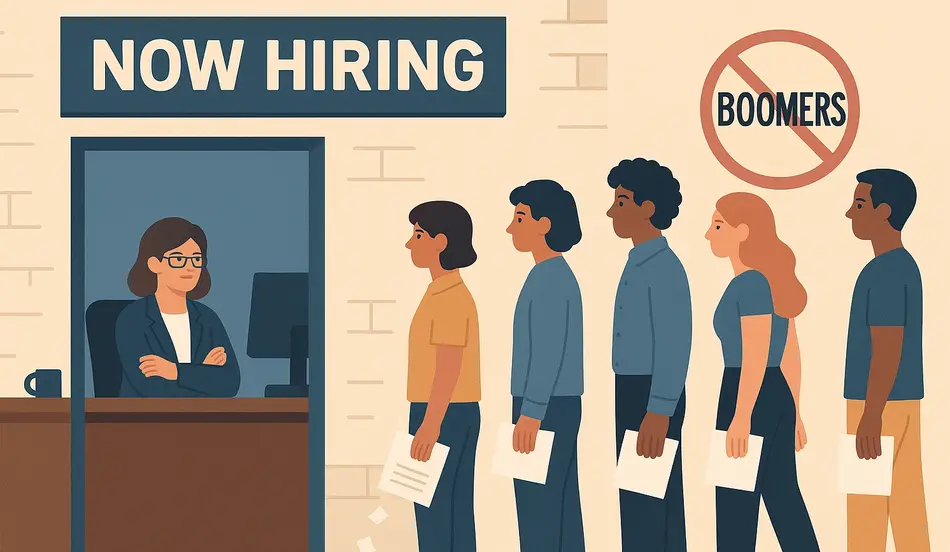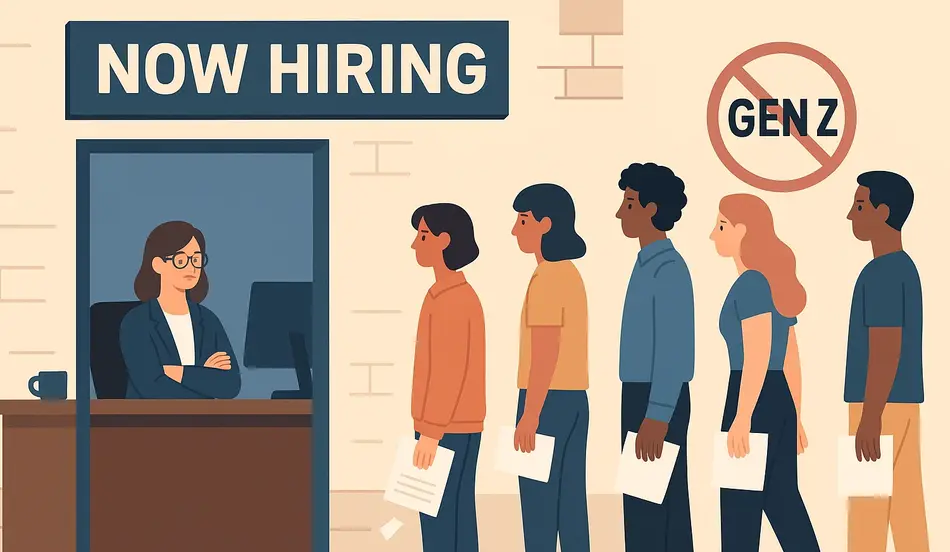Gen Z Hires are facing growing resistance from employers — and the trend is accelerating in 2025. Generation Z—digital natives born between 1997 and 2012—are entering the workforce in greater numbers than ever before. Yet a surprising shift is emerging: a rising number of employers are hesitant or outright avoiding hiring Gen Z candidates. Recent surveys and HR reports reveal that as many as 1 in 10 U.S. employers are stepping back due to communication breakdowns, soft skill concerns, and workplace culture gaps.
While this trend raises concerns about age bias and generational stereotyping, it also signals a broader disconnect between emerging talent and traditional workplace expectations. In an increasingly tight labor market, can employers afford to pass on an entire generation?
Understanding the Growing Divide
The “Ghosting” Phenomenon
One of the top concerns voiced by hiring managers is the frequency with which Gen Z candidates “ghost” potential employers—failing to respond to interview requests, skipping scheduled calls, or abandoning the hiring process entirely. In some industries, employers report ghosting rates as high as 30–40% during initial application rounds.
Recruiters say that ghosting isn’t just frustrating—it’s operationally expensive. “We invest time screening, scheduling, and onboarding candidates, only to be left in the dark,” says one HR executive at a midsize logistics firm. “It erodes trust and costs us time and money.”
Digital-First Communication Preferences
Unlike older generations raised on face-to-face interactions, Gen Z grew up communicating via social media, text, and messaging platforms. Many prefer asynchronous formats over phone calls or in-person meetings. While this is normal to them, it can come across as unprofessional or disinterested to traditional hiring managers.
This digital-first mindset often leads to misinterpretations. A recruiter might view a delayed email reply as lack of enthusiasm, while the candidate simply prefers non-intrusive communication. Without a shared understanding of norms, miscommunication flourishes.
Employers’ Concerns
Perceived Gaps in Soft Skills
One of the most cited issues is a lack of traditional soft skills—eye contact during interviews, professional dress, punctuality, and workplace etiquette. “They’re smart and tech-savvy, but often unprepared for how to present themselves in a professional setting,” says a hiring manager in financial services.
Educational institutions and virtual learning environments during COVID-19 have been partly blamed. Years of remote schooling and isolated digital environments have limited opportunities to develop soft skills in real-world settings.
Unrealistic Job Expectations
Many Gen Z applicants enter the job market with high expectations around salary, flexibility, and career progression—often clashing with what entry-level roles can reasonably offer. Some managers report that Gen Z candidates expect promotions within months, seek remote options without understanding office norms, or are unwilling to perform less glamorous job functions.
The reality is often harsher than anticipated, particularly for those graduating into a hybrid or AI-disrupted labor market with fewer traditional career paths.
👥 Gen Z Job Seekers: Find the Right Fit
Are you part of Gen Z navigating today’s evolving job market?
Explore employer-verified opportunities in Entry-Level, Remote, Digital Marketing, and Customer Support roles — areas where your skills matter.
WhatJobs connects you with companies that value fresh talent, soft skills, and adaptability in the new era of work.
👉 Discover Gen Z-friendly jobs and kickstart your career with confidence.Gen Z’s Perspective
Not Just Entitled—But Cautious
On the flip side, Gen Zers argue that their hesitancy or disengagement is often a response to workplace structures that feel outdated or misaligned with their values. Many prioritize work-life balance, mental health, and mission-driven companies over high pay or prestige.
“It’s not that we don’t want to work,” says Emily, a 23-year-old marketing grad. “We just want to be respected and supported. When we sense that’s missing during the hiring process, we bounce.”

Fear of Exploitation or Burnout
With headlines constantly highlighting workplace toxicity, “quiet quitting,” or mass layoffs, Gen Z jobseekers have grown skeptical. A job offer isn’t automatically a win—it’s a decision to be weighed carefully.
Many are wary of employers who don’t offer transparency on workloads, career progression, or mental health support. They may ghost as a form of silent protest against exploitative or unclear job practices.
The Consequences of Avoidance
Talent Shortages
Small businesses and startups—already facing labor gaps—can’t afford to lose a large swath of young, trainable talent. Avoiding Gen Z applicants risks longer hiring cycles, increased turnover, and reduced innovation.
Diversity and Innovation Loss
Gen Z is the most racially and ethnically diverse generation in U.S. history. Avoiding hiring them narrows the talent pipeline and undermines DEI goals. It also reduces the opportunity to integrate fresh digital perspectives, crucial in a tech-driven economy.
Reputational Risks
In a connected world, reputation spreads fast. Employers that dismiss or stereotype Gen Z risk public backlash on platforms like Glassdoor, LinkedIn, or TikTok—damaging their employer brand among young professionals.
Bridging the Gap: What Employers Can Do
Modernize the Hiring Experience
- Use mobile-friendly application platforms.
- Communicate via preferred channels—text, email, or chat—where appropriate.
- Be responsive and human. A positive candidate experience builds loyalty, even from those who aren’t hired.
Rethink Interviews
- Offer video-based or asynchronous interviews to accommodate different communication styles.
- Shift focus from scripted Q&As to behavioral tasks, role-play, or portfolio reviews.
Provide Clear Expectations
Clearly communicate role duties, growth paths, salary bands, and culture fit. Transparency builds trust and avoids early attrition.
Offer Early Training on Soft Skills
Companies can integrate soft skill modules into onboarding or offer mentorship to ease new hires into professional environments.
How Gen Z Can Adapt
Own the First Impression
Small things like punctuality, dressing professionally, and being prepared for interviews can still make a big impact. Learning to balance authenticity with professionalism is key.
Invest in Communication Skills
In an age of remote work and AI tools, interpersonal skills are increasingly valuable. Gen Zers can stand out by mastering in-person, written, and cross-cultural communication.
Stay Engaged
If interest wanes, be transparent. A quick note declining further participation in a hiring process is more professional than disappearing without a word.
Long-Term Outlook
The generational gap is real—but not insurmountable. Both sides must adapt. Employers need to modernize expectations, and Gen Z needs to develop workplace readiness. The stakes are high: at a time when automation is disrupting jobs and talent is scarce, bridging this gap is critical to futureproofing the workforce.
As the most connected, educated, and socially aware generation in history, Gen Z brings enormous potential. But to unlock it, employers must build bridges—not barriers.
👥 Gen Z Job Seekers: Find the Right Fit
Are you part of Gen Z navigating today’s evolving job market?
Explore employer-verified opportunities in Entry-Level, Remote, Digital Marketing, and Customer Support roles — areas where your skills matter.
WhatJobs connects you with companies that value fresh talent, soft skills, and adaptability in the new era of work.
👉 Discover Gen Z-friendly jobs and kickstart your career with confidence.Final Thoughts
Generation Z is not lazy, entitled, or unreliable—they’re evolving with the times. While 1 in 10 employers may still hesitate, forward-thinking companies are already embracing Gen Z’s strengths to build more resilient, adaptive, and diverse organizations.
Rather than ghosting each other, it’s time for both employers and young professionals to connect—with purpose, empathy, and a shared vision for the future of work.
FAQs
Q: Why are some employers avoiding Gen Z applicants?
A: Employers cite ghosting, lack of soft skills, and mismatched job expectations as key reasons. However, many of these concerns stem from cultural misunderstandings.
Q: Is Gen Z really harder to work with?
A: Not inherently. Gen Z values flexibility, transparency, and well-being—when these are met, they often show high engagement and creativity.
Q: How can employers attract Gen Z talent?
A: By offering purpose-driven work, fair pay, clear expectations, and a tech-forward, inclusive culture.
Q: What can Gen Z do to succeed?
A: Improve soft skills, engage professionally during hiring, and research company culture for better alignment.




